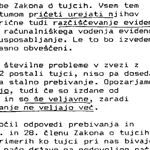With this instruction the Ministry for the first time demonstrated how it intends to interpret the unclear wording of the Act, which stated only that on the specific date “the Aliens Act applies” for these persons.
All Local Administrative Offices for internal affairs in Slovenia received an instruction regarding the implementation of the Aliens Act on 27 February 1992, stating that for all citizens of other Yugoslav republics who have not applied for Slovenian citizenship, and for those, who have applied but have been served a negative decision at least two months ago, the provisions of the Aliens Act come into force on 28 February 1992. With this date the above mentioned persons should start arranging their status, and at the same time the clearing of the records (i.e. the erasure) should begin.
The date set by the Ministry in this instruction is misleading. It states that “the clearing of the records” began on 28 February 1992, but the registrations of the residence were actually erased on 26 February 1992. This means that the affected people had their residence registered from the day of the registration until 26 February 1992 regardless of when the registration was actually erased.
People that resided in Slovenia until 25 February 1992 on the basis of a permanent residence and were in their rights and obligations equal to Slovenian citizens, did not have the right to reside in Slovenia anymore after 26 February 1992, and had to apply for a temporary or permanent residence permit again. This shows how the Ministry of the Interior interpreted the Aliens Act in which this was not specified (note that it was only stated that the Aliens Act will be applied for these people two months after the expiration of the time limit to apply for Slovenian citizenship). With this internal instruction on 27 February 1992 only Local Administrative Offices were informed about this interpretation of the Aliens Act, while the people that were affected by it were not. Nobody informed them about the termination of their registration of permanent residence.
“Clearing up the records” meant that in the register of permanent residents the officials terminated the registration of permanent residence of citizens of other republics of former Yugoslavia, who did not apply for the citizenship of RS by 26 December 1991. For those who applied for Slovenian citizenship but received negative decisions, the date of the erasure was set to two months since the final decision on rejection of citizenship application has been served to them. The officials also wrote in the register, that since the erasure these people lived in one of the other former Yugoslav republics. The official chose the alleged place of residence on the basis of estimated republican citizenship, without verifying if the affected person actually moved there. In fact, most of these people were actually still living in Slovenia, since no one informed them about the erasure and the deprivation of their legal status.
It was written in the dispatch that it was realistic to expect numerous problems with the people that would on 28 February 1992 become foreigners in Slovenia (the date was not correct, the people were considered foreigners without a status already on 26 February 1992). The dispatch also once again stressed that public documents of these people, even if they were issued by the competent authorities of Slovenia and were still valid, were due to the changed status of these people no longer valid.
The authorities, despite being aware of the problems the erasure would cause, decided to deprive them of their legal status. In fact, they even adjusted the measures to the expected problems. The Ministry of the Interior once again instructed the Local Administrative Offices to remove and destroy passports and personal ID cards which were for foreigners no longer valid – which was in contradiction with the Passports of the Citizens of RS Act. Further, the termination of validity of ID cards, issued in the time of former Yugoslavia, which were still valid, was not regulated by the legislation until 1997. Nevertheless, ID cards of the erased people were also destroyed.
Further measures, with which, according to the Ministry, these issues should be resolved, were deportations. The ministry responded to the issue of conflicting interpretations of the provisions regarding residency and deportation by Articles 23 and 28 of the Aliens Act. It took the position that if a foreigner illegally comes to the territory of Slovenia or is living in Slovenia without the residence permit, the Article 28 applies. According to this provision an authorized official of the Authority of Interior (the police) had the right to bring the foreigner to the state border and deploy him/her without any decision of the Administrative Office (deportation). The citizens of other republics of former Yugoslavia who were erased and deprived of any legal status, of course did not come to Slovenia with a passport, visa, entry permit or residency permit, because this was not necessary – there were no borders between republics of the former Yugoslavia before its dissolution. Nevertheless, this instruction referred to them as well. Numerous testimonies of the erased people confirm that they actually experienced deportations (see the stories of the erased people on this portal).






